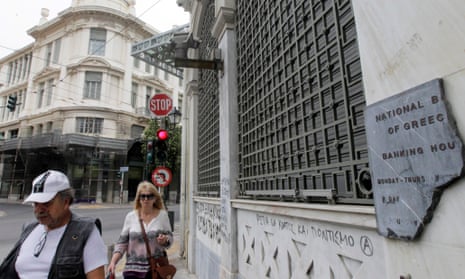Greece could secure vital weeks to negotiate a rescue deal with its creditors if Athens is able to delay repayments worth €1.6bn (£1.1bn) to the International Monetary Fund (IMF), as critical deadlines approach.
The proposal to combine four IMF repayments due in June and delay payment until the end of the month would win more time for vital debt talks that resumed on Tuesday.
Greece must repay €300m on 5 June, the first of four instalments due next month . The IMF, its biggest creditor after the European Union, often waits a month before receiving funds from debtor countries.
A senior eurozone official close to the talks with Athens told Reuters: “There is the possibility of putting together several payments that Greece would need to make to the IMF in the course of June and then just make one payment.”
The news agency said a second official close to the talks also acknowledged that a payment delay was a possibility.
The first official said: “That’s basically a technical treasury exercise and they could tell the IMF that this is how they want to do it and the IMF would probably have to be OK with that.”
Shut out of international markets, Athens has conceded that it will miss the 5 June payment without new loans from the EU, which is demanding reforms that will make the country’s debt sustainable.
Last week, the interior minister, Nikos Voutsis, a longstanding ally of the prime minister, Alexis Tsipras, said the country needed to strike a deal with its European partners within the next couple of weeks or it would default on its IMF repayments.
In remarks that heightened the possibility of a default, he said: “This money will not be given and is not there to be given.”
The finance minister, Yanis Varoufakis, insisted again that a deal is imminent without giving details of the concessions which may form part of it.
It is understood that Tsipras has taken full control of the negotiation process, sidelining Varoufakis and his ministry, which failed to reach an agreement with eurozone ministers in the past four months of talks over a new financing deal.
Tsipras wants the EU, the IMF and the European Central Bank to agree the release of a blocked final €7.2bn tranche of bailout funds without imposing tough reforms and spending cuts agreed with the previous right-of-centre administration.
Under pressure from leftists in his party, the prime minister has also played down fears that Athens will be unable to find about €1bn to pay public sector wages and fund welfare payments in the first week of June.
Some senior figures at the European commission and the IMF have urged greater flexibility from creditors, including a more lenient attitude to payment dates while talks are making progress.
While a missed payment to the IMF would not constitute a default, it could trigger a negative market reaction, officials said.
“Unless there is some perspective how they would deal with this full payment, it would be a risky thing for the Greeks to do. And the consequences would be unpredictable,” said the first official.
Earlier this week, a Greek government spokesman dismissed the possibility of combining the IMF repayments.

Comments (…)
Sign in or create your Guardian account to join the discussion